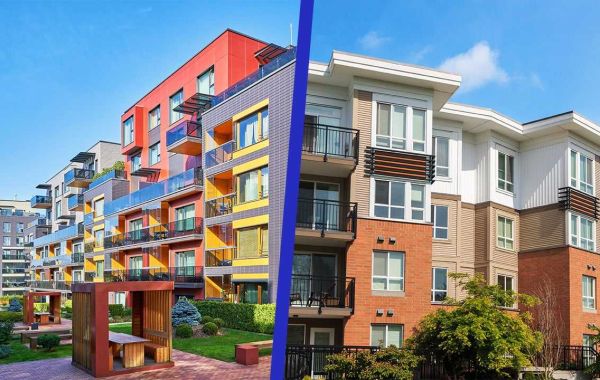For many first-time buyers entering today’s real estate market, the choice between a condo and an apartment can be confusing. While both types of properties may look similar, they offer very different living experiences—especially when considering condo vs apartment rent, ownership opportunities, long-term costs, and lifestyle flexibility.
Understanding the pros and cons of each is critical before making a major financial commitment. Whether you're looking to buy or rent, this guide breaks down the key differences and advantages of condos and apartments, so you can make the best decision for your future.
What’s the Difference?
Let’s start with the basics. A condo (short for condominium) is a unit that is individually owned, usually within a larger residential building. Condo owners share access to common spaces such as lobbies, gyms, or pools, and they typically pay monthly HOA (homeowners association) fees for building maintenance and amenities.
An apartment, on the other hand, is a rental unit within a complex or building that is owned by a landlord or property management company. When you rent an apartment, you're not responsible for building upkeep or long-term ownership responsibilities.
Understanding the condo vs apartment rent structure is key to deciding which is right for you as a first-time buyer or renter.
Pros of Condos for First-Time Buyers
1. Ownership and Equity Building
Perhaps the most compelling benefit of choosing a condo is the opportunity to own property. As a condo owner, you're investing in real estate, building equity over time, and potentially gaining value if the market appreciates.
While condo vs apartment rent favors apartments for short-term affordability, condos are better for long-term financial growth.
2. Lower Purchase Price Than Homes
Condos are generally more affordable than single-family homes, especially in urban areas. This makes them a smart option for first-time buyers who want to get into the real estate market without a massive mortgage.
3. Access to Amenities
Condos often come with shared amenities such as gyms, pools, community rooms, and even security services—all covered by your monthly HOA fees. These features can enhance your quality of life without requiring personal maintenance.
4. Potential for Rental Income
If your lifestyle changes, owning a condo offers the flexibility to rent it out and generate income—something renters in apartments can’t benefit from.
Cons of Condos for First-Time Buyers
1. HOA Fees and Rules
Monthly HOA fees can range from $200 to $800 or more depending on the building and location. While they cover maintenance and amenities, these fees are non-negotiable and can increase over time.
Additionally, HOAs enforce community rules that might limit your choices (e.g., pet restrictions, remodeling limits).
2. Limited Control Over Building Decisions
Unlike owning a single-family home, owning a condo means you’ll share decision-making with the HOA. If the building needs repairs or upgrades, you might be required to contribute through special assessments, which can be expensive.
3. Resale Value Can Be Unpredictable
Condos don’t always appreciate as quickly as houses. In some markets, resale demand for condos is lower, which may impact your return on investment if you plan to sell in a few years.
Pros of Renting an Apartment
1. Lower Short-Term Costs
When comparing condo vs apartment rent, renting an apartment generally comes with lower upfront costs. You’ll usually only need to pay a security deposit and one or two months’ rent—far less than a down payment or closing fees.
2. Flexibility and Mobility
Renting is ideal if you’re not ready to settle down. Leases usually run 12 months or less, giving you the freedom to move without worrying about selling a property.
3. No Maintenance Responsibilities
If something breaks in an apartment, you don’t have to fix it—management takes care of repairs at no cost to you. This convenience is especially appealing to first-time renters or busy professionals.
Cons of Renting an Apartment
1. No Equity or Ownership Benefits
Every rent payment is money that goes to your landlord—not an investment in your future. Over several years, this can add up to tens of thousands of dollars with no return.
2. Limited Customization
Most apartment leases don’t allow for modifications like painting walls, installing fixtures, or making upgrades. You may have to live with outdated appliances or finishes without the freedom to change them.
3. Rent Increases Over Time
Unlike a fixed-rate mortgage, rent can—and often does—increase every year. In cities with high demand, rent hikes can significantly impact your long-term budget.
Condo vs Apartment Rent: Which Is Right for You?
Here’s a quick breakdown to help you compare condo vs apartment rent and ownership:
| Feature | Condo Ownership | Apartment Renting |
|---|---|---|
| Upfront Cost | High (down payment, closing fees) | Low (security deposit, rent) |
| Monthly Cost | Mortgage + HOA + taxes | Rent + utilities |
| Equity/Ownership | Yes | No |
| Maintenance | Owner responsibility | Landlord responsibility |
| Flexibility | Less (requires selling to move) | High (easy to relocate) |
| Customization | More freedom | Limited |
| Long-Term Investment | Appreciates over time | No investment return |








